Current Projects
Under the coordination of the Department of Plant-Based Foods, and in close collaboration with the Bioeconomy Office Hohenheim, twelve departments of the Institute of Food Science and Biotechnology, the Department of Phytopathology, and the University of Hohenheim’s research funding services, €1.1 million has been acquired to establish a new research platform.
The C.A.T.A.L.I.S.T. project is creating the Hohenheim Cellular Agriculture Platform, which harnesses agricultural biomass streams biotechnologically and sustainably in line with a food-first strategy. Using scalable bioreactor systems, it enables bacterial and fungal precision fermentation to produce functional, safe, and healthy foods and food ingredients.The Department of Phytopathology will integrate the platform into its own bioreactor-based research activities.Embedded in Stuttgart’s bioeconomy innovation ecosystem, C.A.T.A.L.I.S.T. creates bio-intelligent interfaces between open-air and indoor farming, strengthens research capacities and skills development, and supports the transformation of the food system towards a resilient and globally sustainable bioeconomy.
FEIH_FG_3014039
Duration: 05.02.2026-31.10.2027
Funding: 1.147.770 € + 398.830 € (Eigenmittel) - Total: 1.537.600 €
The project is funded by the Baden-Württemberg Ministry of Science, Research, and the Arts and co-financed by the European Union with ERDF funds.


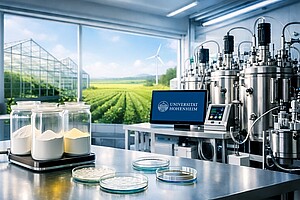
Plant proteins determine the structure, texture, stability and sensory properties of a foodstuff, as well as its nutritional value. These technofunctional properties depend strongly on the so-called conformational potential of the proteins, which is influenced by composition, amino acid sequence and the structure states that change during production. Process and environmental conditions during the production of protein preparations therefore influence their functional behaviour in subsequent applications. In practice, however, there are no standardised methods to reliably capture this technofunctional potential as a quality criterion and evaluate batch differences. The project therefore aims to develop reproducible and robust standard methods for characterising gel formation, emulsifying and foaming properties under realistic environmental and process conditions. Based on these methods, a technofunctional "fingerprint" will be defined that will enable the application potential of protein preparations of different origins and processing to be evaluated in a comparable manner.

IGF-Research project 01IF23919N
Project duration: 01.08.2025 - 31.01.2028
Funding University of Hohenheim: 495.630€ - Total project volume: 740.897€
The project is financed by funds from the Research Association of the German Food Industry e.V. (FEI) as part of the programme to promote industrial community research (IGF) from the Federal Ministry for Economic Affairs and Energy.
Project partners:
University of Hohenheim
Technical University Berlin
Association of the German Dairy Industry e.V. (MIV), Berlin
Association of German Agricultural Inspection and Research Institutes e.V. c/o LUFA, Speyer
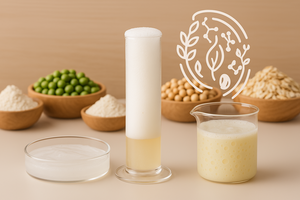
The S-TEC Centre for Bio-Intelligent Value Creation in Stuttgart is an innovative ecosystem for biological transformation, specifically linking research and industry. In response to climate change and evolving value creation structures, it supports companies in utilising bio-intelligent technologies to enhance their competitiveness. As a central point of contact, the centre brings together the expertise of partners such as Fraunhofer IPA and Fraunhofer IGB, as well as the universities of Hohenheim and Stuttgart, thereby promoting effective knowledge transfer. The centre raises awareness, empowers companies, builds relevant skills, supports start-ups and strengthens technology transfer. In this way, the centre drives sustainable industrial transformation, supports the development of new technologies, and establishes Baden-Württemberg as a leading region for biointelligence. It thus strengthens the economy's innovative capacity and helps to overcome global challenges.
Projec duration: 18.07.2025 - 31.12.2027
Funding University of Hohenheim: €1,211,941.72 € - Total project volume: €8,9 million
The S-TEC Center for Biointelligent Value Creation, known as The Biointelligence Engine, is funded by the Baden-Württemberg Ministry of Economic Affairs, Labor, and Tourism and the European Union's ERDF (European Regional Development Fund) funding program.


The S-TEC Center The Biointelligence Engine supports companies in combining biology, technology, and computer science—for more efficient processes, resilient products, and sustainable business models. Whether you are just starting out or scaling up, we help you identify potential, develop concepts, and implement funded projects—together with experts from research and industry. This is how biointelligence becomes a concrete solution to real challenges.

The S-TEC Center is a transfer format involving a total of nine departments at the University of Hohenheim. The project is coordinated by the Department of Plant Foods
under the direction of Prof. Dr. Mario Jekle.
To achieve this, we offer the following services to companies, especially SMEs or Start-ups:
– Quick Checks
– Exploring Projects
– Feasibility Studies
To learn more about the formats, please visit: https://s-tec.de/zentren/the-biointelligence-engine/
If you have any questions about the transfer formats, please contact the center coordination team: Dr. Evelyn Reinmuth - contact: Evelyn_Reinmuth@uni-hohenheim.de
Further information will be available here soon: https://biointelligence.uni-hohenheim.de/
The Hohenheim S-TEC Center for Biointelligent Value Creation combines the following key topics:
Food-Tech, Nutrition und Agri-Tech
Food-Tech:
Dept. Plant-based Foods - https://plant-based-foods.uni-hohenheim.de/
Dept. Process Analytics - https://process-analytics.uni-hohenheim.de/
Dept. Flavor Chemistry - https://aromachemie.uni-hohenheim.de/
Dept. Food Informatics - https://foodinformatics.uni-hohenheim.de/
Dept. Engineering biointelligent Systems
Nutrition:
Dept. Human Nutrition and Dietetics - https://ernaehrung.uni-hohenheim.de/
Dept. Food Biofunctionality - https://nutres.uni-hohenheim.de/
Dept. Molecular Nutritional Science - https://molnutsci.uni-hohenheim.de/
Agri-Tech:
Dept. Artificial Intelligence in Agricultural Engineering - https://ki-agrartechnik.uni-hohenheim.de/
Our diet is at the intersection between individual preferences and global challenges such as environmental pollution and health. Recommendations such as those of the DGE emphasise a plant-based diet and a higher fibre intake. However, due to their properties, dietary fibres often impair the sensory quality of food. Particularly in communal catering for vulnerable groups such as the elderly or the sick, for example in care catering, a healthy diet and therefore a high fibre intake with consistently high sensory quality is crucial. Our solution is innovative "Textured Meal Components" (TMCs), which are developed as wholesome, plantbased and fibre-enriched menu components and are not just substitute products. These should offer a high level of acceptance and flexibility in order to fulfil special nutritional requirements. The BallanceID project develops and implements TMCs, taking into account regionality, sustainability, consumer acceptance and cost-effectiveness. It promises innovations along the value chain with the aim of establishing healthier and more sustainable nutrition in communal catering, particularly in care catering. Results are utilised and further developed in a practical manner.
Funding reference: 281A909A22
Project duration: 15.11.2025 - 14.05.2028
The project is financed by funds from the Federal Ministry of Agriculture, Food, and Rural Affairs (BMLEH).
Coordinatior: Department of Plant-based Foods, University of Hohenheim
Funding: € 2,096,455.03 -> Private-Public Partnership, includes company funding
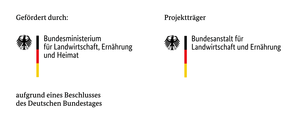
Project partners:
Dept. Biobased Resources in the Bioeconomy (340b) University of Hohenheim
Fraunhofer-Institut für Verfahrenstechnik und Verpackung (IVV)
Institut für Psychologie, Professur Wahrnehmungspsychologie, FAU Erlangen-Nürnberg
LBV Raiffeisen eG, Schrozberg
J. Rettenmaier & Söhne GmbH + Co KG
FB Food GmbH
ISS Facility Services Holding GmbH
apetito AG
BOONIAN GmbH
Assoziierter Partner:
Edeka Südwest
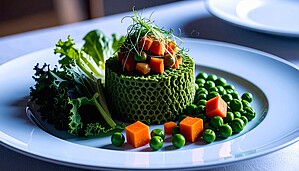
Mycoprotein is the protein-rich biomass of fungal mycelium and is recognized for its outstanding biological value. In addition, the species used have a generally low ecological footprint and the potential to utilize previously unexploited side streams from the food industry as a substrate. On the one hand, this contributes to the protein supply of a continually growing world population and meets the rising trends in diets that aim to reduce or completely avoid the consumption of animal products. On the other hand, it opens up possibilities for the use of resources in the sense of a sustainable circular economy. This project is dedicated to the development and extraction of natural vegan cheese flavors and the characterization of the mycoproteins obtained, which are to be used as structural components for the production of vegan cheese alternatives.
01IF23315N
Projekt duration: 2024 – 2026
The project is funded by the Federal Ministry of Economics and Climate Protection and the Forschungskreis der Ernährungsindustrie e.v.
The project partner is the Department of Flavor Chemistry of the University of Hohenheim.
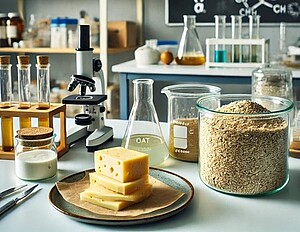
Awareness of the environmental impact of packaging is growing. Efforts are being made to introduce more sustainable solutions and regulations, and to optimize or rethink existing processes. Innovative packaging technologies with antimicrobial functionality contribute to increased food safety. Biosensors for detecting physical-chemical or biological changes in food also reduce food waste and make packaging intelligent.
For the "QuiPack" project, by-products and residual streams from agriculture and aquaculture have been identified as potential material sources for the production of environmentally friendly and innovative packaging solutions. A holistic, integrative design approach for the development and implementation of functional food packaging solutions is being developed that:
- Upgrades waste and by-products along the agricultural and aquaculture food supply chain,
- Introduces biointelligent coatings and packaging materials that meet market demands in Europe and the Maghreb region,
- Is linked to AI/IoT-supported intelligence and decision support systems to optimize food safety, traceability, environmental impact, sustainability, and cost efficiency.
The innovative approach is accompanied by tailored communication, training, and dissemination measures, as well as consumer studies to support market introduction, penetration, and spread.
Funding Reference: 02WPM1729A
Project Duration: 2024-2027
Research Partners: Hochschule der Medien – Stuttgart/DE; University of Vic - Central University of Catalonia – Barcelona/ES; Ecole Nationale Vétérinaire, Agroalimentaire et de l'Alimentation | ONIRIS – Nantes/FR; University of Thessaly – Volos/GR; Agritrack S.A. – Athens/GR; University of Venice – Ca Foscari | UNIVE – Venice/IT; Université Mohammed Premier Oujda – Oujda/MA; Moroccan Foundation for Advanced Science, Innovation and Research – Rabat/MA; University of Aveiro – Aveiro/PT; Centre de Biotechnologie de Borj Cédria – Hammam-Lif/TN; Atatürk University – Erzurum/TR
The CHIAM project aims to develop a climate-smart solution for sustainable food systems that directly addresses the challenges outlined in the FOSC call. By enhancing new agricultural technologies and redesigning the network of existing African agri-food value chains, the project seeks to increase resilience, sustainability, and circularity. A key component is the use of the interconnected chia-mushroom-pig biogas value chain, contributing to the diversification and resilience of African food systems against climate change impacts.
The goal of the project partner in Germany is to develop nutritionally valuable foods by enriching staple foods locally used in Kenya with chia seeds and oyster mushrooms and optimizing their production processes.
- CHIAM: 2821ERA19C
- Project Duration: 01.06.2021 - 31.03.2025
The project is funded by the Federal Ministry of Food and Agriculture (BMEL) based on a decision of the German Bundestag through the Federal Office for Agriculture and Food (BLE).
For more information, visit the project websites of the Federal Office for Agriculture and Food (BLE) and Era Learn:
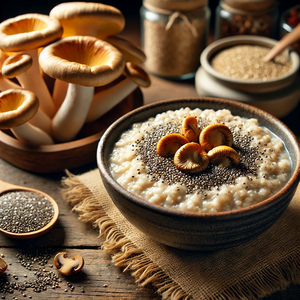
Created with AI DALL-E
Ongoing climate change and the resulting extreme weather phenomena, such as heavy rainfall or droughts, require new strategies in food production to ensure the availability of high-quality cereal-based staple foods in Europe. One strategy is the European cultivation of new, unconventional grain cereals that are already successfully established in other continents due to their yield, robustness, and resistance to heat and drought, while emitting few greenhouse gases. Sorghum millet is a promising cereal for this purpose. However, the use of this plant is not culturally established in Europe and its usability for common European foods has hardly been researched so far.
In this context, the aim of the transnational and interdisciplinary research project is to develop a processing strategy for drought-resistant and regionally cultivable sorghum. After identifying suitable sorghum varieties, a milling process for dry fractionation will be developed and optimized. The fractions will then be technologically and nutritionally functionalized for use in high-value cereal-based food systems.
CORNET C-2023-03 / 01IF00370C
Project duration: 2024-2026
Research Partner:
Secondary College for Food Technology (HTLLMT), Wels
University of Natural Resources and Life Sciences Department of Food Science and Technology (BOKU), Vienna
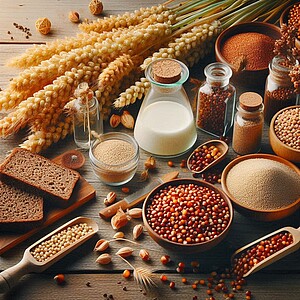
Yeast, derived from local by-products of the fermentation and brewing industries, shows promising potential as an alternative protein source. Integrating this protein into human nutrition could boost protein production in rural areas, thereby supporting the state strategy for a sustainable bioeconomy in Baden-Württemberg. Within the scope of the yPRO+ research project, the focus is on developing a process strategy for the functionalization of the previously unused yeast protein. This strategy aims to establish yeast protein as a functional food ingredient and integrate it into the value chain. These measures are intended not only to promote sustainable bioeconomy but also to strengthen the resilience of the regional supply chain in the food sector.
yPRO+ BWFE320071
Project duration: 2023-2026
This project is supported by the Ministry of Food, Rural Areas and Consumer Protection Baden-Württemberg (MLR).
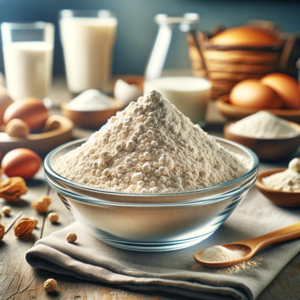
Created with AI, DALL·E
Fruit preparations (FP) are made from fruit in the form of fruit pieces, fruit pulp, and juice using different types of sugar, natural flavorings and flavoring extracts, coloring foods, edible acids and other ingredients if necessary. The even distribution of the fruit pieces in the FP represents a special requirement for these semi-finished goods and is guaranteed by hydrocolloids. However, as food additives, these must be declared, which runs counter to the clean labeling trend. The aim of the research project is therefore to develop an innovative approach to the microbial production of viscosity-increasing hydrocolloids in situ by means of fermentation and the integration of these fermentates into the FP production. Exopolysaccharides (EPS) are to be produced directly in fruit components of FP or in fruit-containing FP premixes by fermentation with lactic acid bacterial strains in order to thereby increase the viscosity and thus bring about structural stabilization. The rheological requirements for the fruit components and the processability of the FP are to be met through the formation of EPS. In addition, the overall sensoric properties of the FP should not be impaired or should be improved.
Old: AiF 22473 N
New: 01IF22473N
Project duration: 2022 - 2025
Research partners:
University of Hohenheim, Department of Food Microbiology and Hygiene
University of Hohenheim, Department of Bioorganic Chemistry
Quality of gluten-free doughs and breads was already improved by additives, as for example the hydrocolloid HPMC. Though, gluten-free doughs and breads still show nutritive, textural and aromatic deficits compared to wheat-based products, which also impacts the consumer. The challenge is to mimic the characteristic properties of the gluten network.
Newest findings demonstrate that arabinoxylans (AX) can replace the structure giving gluten network, through linkage of ferulic acid residue, to a certain extent. However, carbohydrate-based networks are not able to reach the excellent properties of gluten. Hence, the idea and goal of the project is an enzymatic linkage of proteins and AX via ferulic acid residues and tyrosine. This protein-AX network should have similar properties as gluten and therefore improve gluten-free doughs to an unprecedented extent. The grains oat, maize and corn were identified as suitable raw material due to their high quality of AX and high amount of tyrosine among proteins. Another goal is the characterization of the new network and its influence on dough properties and baking performance. For the realization of the project, an interdisciplinary approach was chosen, comprising grain technology (grinding, fractionation), biotechnology (enzyme promoted linkage), physics (dough rheology), polymer chemistry and analytics
PROTAX GZ: JE 950/1-1
Project Duration 2022-2025
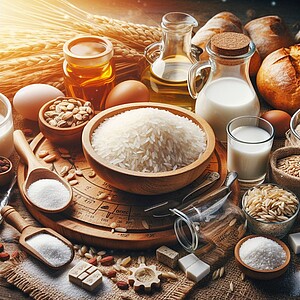
Research Partner:
Austrian Agency for Health and Food Safety GmbH (AGES)
Institute for Food Technology at the University of Natural Resources and Life Sciences in Vienna (BOKU)
Completed Projects
The climate and pollution crises, on the one hand, and resource depletion and scarcity on the other hand, call for new ways of designing food packaging in terms of materials and production. Reuse2Repack project, as a part of the EIT Food Solutions Program, focuses on finding solutions for food packaging using food waste materials. These solutions are driven by the incorporation of food waste streams in bio-based packaging and by the design of alternative strategies for reusing food packaging materials. Within the scope of this project, Master’s students are tasked with achieving a functional food packaging prototype produced from food waste. Addressing several development and production milestones, the project participants have the opportunity to develop full business models and financial plans. A final event is carried out, where the project participants have to pitch their product to a panel of judges for a final evaluation.
Project duration: 2022
Partners:
- EIT Food Education (EU)
- Aarhus University (Denmark)
- University of Turin (Italy)
- CSIC (Spain)
- Swiss Food Research (Switzerland)
- Puratos (Belgium)

Growing world population, restrictions on agricultural production due to climate change and geopolitical crises pose significant challenges to food production. This applies above all to the supply of proteins for food. The protein production from biomass (e.g. brewer's yeast or other fermentation residues) is significantly more sustainable than animal and partly vegetable proteins and represents an ideal example of bioeconomic use.
The aim of the project is to develop the potential of targeted modifications of protein functionalities from natural resources in order to enable their use in human nutrition.
Project duration: 2022-2023
Project was supported by the Ministry of Food, Rural Areas and Consumer Protection Baden-Württemberg (MLR).
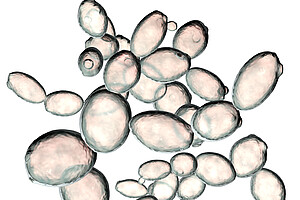
Gluten-free baked goods are becoming more popular and have long since outgrown their niche existence; Drivers of this development are at most the positive assessments of consumers with regard to the health-promoting and nutritional value of these products. In contrast to baked goods containing gluten, gluten-free baked goods, such as B. breads, starches or high-starch, highly refined flours from (pseudo) cereals are used. Structure-stabilizing proteins are missing in these flours, which in particular impairs the water-binding capacity and the gas-holding capacity of gluten-free doughs and, via the latter, the crumb texture of the bread. In order to improve the gas holding capacity of the dough, complex formulations are usually used to produce gluten-free baked goods. These are often synthetic hydrocolloids and emulsifiers, which, however, contradict the consumer trend towards clean labels (“without additives”). The aim of the research project is the use of plant-based surface-active and foam-stabilizing substances (OSS) to increase foam formation and foam stability in gluten-free dough. Known mechanisms of foam formation and stabilization are to be transferred to the complex medium of gluten-free doughs by vegetable OSS (saponins and proteins) and thus the gas retention stability up to thermal stabilization (baking) is to be increased in order to produce high-quality gluten-free baked goods, such as e.g. B. breads, with improved crumb texture and better volumes.
Old: AiF 22564 N
New: 01IF22564N
Project duration: 2022 - 2025
Research partner:
Technical University of Munich, Chair of Brewing and Beverage Technology
Acrylamide is a process contaminant generated during heating of carbohydrate-rich, especially starch-based foods. The main formation pathway of acrylamide is described with the reaction of the amino acid asparagine and reducing sugars such as glucose. A low water content and a high temperature during production are beneficial for this reaction, which is particularly the case in the production of baked goods. Most notably, the formation of acrylamide is elevated in breads with special ingredients compared to standard baked goods. Preliminary studies have shown that these processed products clearly exceed the guideline values for acrylamide set in the EU. The aim of the research project was to develop a successful minimization strategy for acrylamide in baked goods with special plant-based ingredients, based on the knowledge of the diffusion and migration behavior, the formation kinetics of acrylamide and the influence of the targeted adjustment of the moisture content of the special ingredients.
01IF22209N
Project duration: 2021 - 2024
Research Partner:
Institute for Food and Environmental Research e. V

Final report available on request
